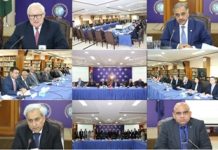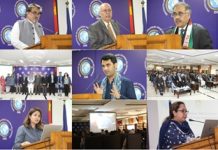Pakistan’s relationship with Afghanistan is strategically too important for stability and peace within Pakistan and in the region to be left to the private groups or be subject to any ambiguity or ambivalence on Pakistan’s part
The world around Pakistan and beyond has changed during the past five years, and the pace of change is likely to quicken further in the coming years. What has changed is too obvious even to an ordinary observer. But let’s recap.
Afghanistan continues to remain troubled and uncertainty about its future hangs thick. This will have serious security repercussions for Pakistan. Under the American guns and thunder, Iraq is now a failed state and on the verge of disintegration along ethnic and sectarian lines. What should concern Pakistan and other Muslims states is the destructive sectarian civil war that has sucked in Iran and is likely to draw Arab states into this conflict. The issue of Islam, ethnicity and the contest over political power in the emerging Central Asian states will also have vibrations in all directions.
Located at the crossroads of ethnic and religious polarisations, Pakistan is caught in deadly crossfire. One the one side are the United States-led western countries trying to win two wars and shaping the security of these regions according to their vision of peace and stability. On the other hand are theocratic Iran and Islamists with a different agenda of political change and national security. It may not necessarily be the infamous clash of cultures, but a bipolar worldview on what is good for the Muslims societies and who has the right and responsibility to define that good has definitely emerged.
This is not a simple question; it involves larger issues of state sovereignty, regional autonomy and self-determination of peoples, communities and nations. The Southwest region and Afghanistan have reached a new boiling point and it is unclear if our policymakers have the vision, depth and the sense of history to grasp the political and security trends and realise the dangers ahead.
Instead of relying on the robustness of institutions and the depth of collective thinking on national security issues, we lack clarity, remain ambivalent and rely heavily on ‘great men’ to give us direction. It should be obvious that relations with Afghanistan constitute the most important regional relationship for Pakistan in terms of the latter’s security. Consider the elements that impinge on Pakistan’s national security: common ethnicity, porous borders, migration, refugees and movement of non-state actors, to list a few and it should be clear that the insecurity and instability of Afghanistan will have great impact on our own stability and security.
Pakistan’s declared policy of non-intervention and support to international coalition of forces for stabilising Afghanistan lacks credibility. With every incident of violence, the Afghan government, foreign media, and most importantly the United States point fingers at Pakistan. Islamabad’s response to these accusations has not changed a bit. The foreign office spokesperson reads the same line again and again: Afghanistan and international coalition of forces have failed in their efforts to secure and stabilise the country, and they use Pakistan as a scapegoat for their own weaknesses.
True, international forces in Afghanistan have many failures and weaknesses to account for, and the pace of economic and political reconstruction has been slow. Rebuilding a state and its institutions, reintegrating diverse ethnic communities into a single nation-state and rebuilding infrastructure are ambitious objectives that cannot be realised in the face of growing insurgency in some of the Pashtun regions bordering Pakistan.
Yet, Pakistan’s famous line on Afghanistan is neither trusted by our allies in the war on terror nor given any respect by the leaders of Afghanistan. In the vastly changed circumstances of the regional setting Pakistan cannot afford to entirely dismiss as rubbish, as unfortunately Islamabad has tended to do, whatever the leaders of Afghanistan and the world say about its polices. In fact the line on Afghanistan has become a joke in the academic as well as policy circles around the world. The credibility gap has widened over the past couple of years. Most important in this regard is Pakistan’s assertion that insurgents in Afghanistan will not be allowed access to Pakistani territory and resources in terms of shelter, sanctuaries and any other material support.
It is time to change our line on Afghanistan, in fact Pakistan should have done it a long time back: Afghanistan belongs to the Afghans; Pakistan will remain neutral in the current and future power struggles, and will not allow ethnic and religious groups from east of the Durand Line to give support in men and material to likeminded groups across the border. Obviously, Pakistan would not accept a similar policy from Afghanistan.
One important sign of the fragility of a state is that private groups encroach upon its sovereign territory by pursuing private foreign and security policies. Afghanistan’s ethnic groups and Pakistan’s religious parties have been running parallel polices with or without any meeting point with the sate. This is also a legacy of the war of resistance in Afghanistan. But today’s world is different, and the decoupling of the private groups and the public national security establishments in both the countries is a must.
This is an area where states’ institutional and political capacity needs to expand, and their writ extended to the border regions and other areas outside of such control. This is not happening at all; at least the result of this kind of capacity are not visible on either side of the Durand Line. A recent statement by Maulana Fazlur Rehman, leader of the opposition in the national assembly, that he directs his followers to support Taliban fighters in Afghanistan by providing “humanitarian aid”, and that “we support anyone who is struggling for the implementation of an Islamic government” will confirm the doubts of Pakistan’s security partners. It is equally true that some of the Afghan leaders have been found involved in sabotage activities in Balochistan apparently to avenge our failure to control the flow of aid to the Taliban.
Pakistan’s relationship with Afghanistan is strategically too important for stability and peace within Pakistan and in the region to be left to the private groups or be subject to any ambiguity or ambivalence on Pakistan’s part. Islamabad must listen to the world and its Afghan friends carefully about what they say about Pakistan’s involvement in Afghanistan, real or imagined. A free, united, stable and sovereign Afghanistan is in Pakistan’s national interest. Its troubles have been, and will be Pakistan’s troubles. Pakistan should shed its doubts on this score and proactively remove the doubts of the partners regarding its will, intentions and actions.
The author is a professor of Political Science at the Lahore University of Management Sciences.













